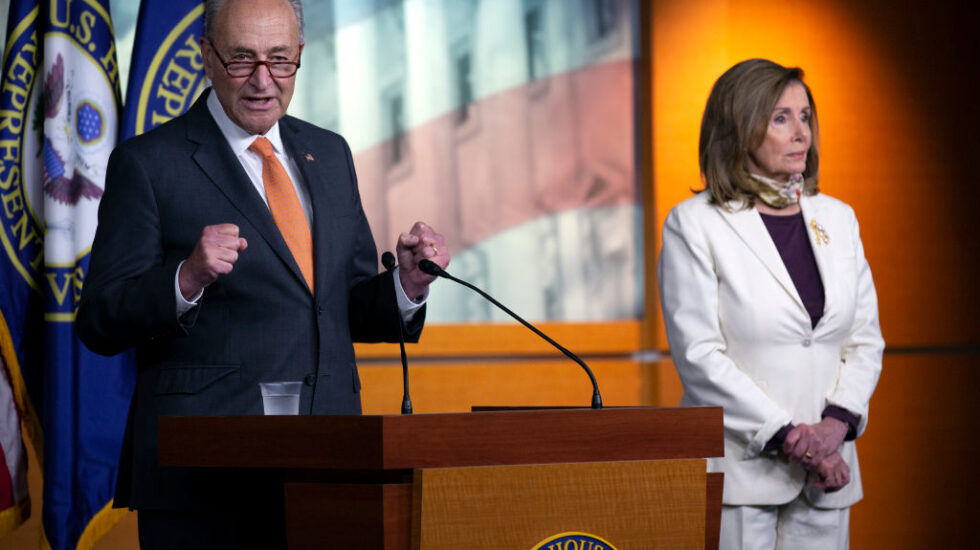A rift in the Democratic party between moderates and progressives threatens to derail two pieces of legislation that embody much of President Joe Biden’s domestic agenda.
In August, the U.S. Senate passed a bipartisan bill that includes $550 billion in new spending on the nation’s roads, bridges, broadband, and water systems, among other “hard infrastructure” priorities like the electrical grid and public transportation.
The U.S. House of Representatives has to approve that bill before it becomes law. Progressives in the House believe it didn’t go far enough – particularly on the issue of climate change mitigation – so they’ve indicated that they would only vote for its passage after a separate $3.5 trillion package was approved by the Senate. Over a 10 year period, that package would fund universal pre-k, free community college, paid family leave, and clean energy programs while expanding Medicare, child care, and elder care.
Speaker Nancy Pelosi (D-CA) accepted this condition, promising progressives that the two bills would be linked together in the House. In other words, one wouldn’t pass without the other.
But the initiatives in the second package – and the associated tax increases on wealthy Americans and corporations – are anathema to Republicans. So Senate Democrats could only bypass an inevitable filibuster by pursuing the $3.5 billion package through reconciliation. That’s a budgetary process that can be used once a fiscal year and it requires a simple 50 vote majority.
If Democrats moved in locked step, that wouldn’t be a problem. But Senators Joe Manchin (D-WV) and Kyrsten Sinema (D-AZ) have expressed opposition to the $3.5 trillion price tag. They are currently negotiating with the White House and Democratic leadership on a potential compromise. Manchin has said he’d support a deal that includes closer to a trillion dollars in new spending.
But the uncertainty leaves Pelosi in a bind. She’s already vowed that the House would vote on the infrastructure bill on September 27th. It’s clear that she won’t be able to keep her promise to progressives by then. That is – the Senate will not have passed along the reconciliation package progressives covet.
On Tuesday, Rep. Pramila Jayapal (D – WA), the chairwoman of the Congressional Progressive Caucus, reiterated her position that the two bill must be paired, telling reporters, “We are excited to vote for the infrastructure bill as soon as the reconciliation bill passes; the two have to go together, that was the deal that was made.”
Complicating matters is a feeling of resentment brewing among moderate House Democrats, who are angry that the progressive wing of their party is willing to hold the infrastructure bill hostage. But it’s more than just a strategy disagreement. Like Manchin and Sinema, a group of House Democrats think the reconciliation bill is too ambitious and too expensive. One Democratic House aide told the Wall Street Journal that centrist Democrats are so opposed to the $3.5 trillion price tag, that they’d rather tank both bills than pass both bills.
So even if Pelosi somehow manages to present the bills simultaneously, there’s the risk of rebellion from moderates within her own party who want to reduce the spending in the reconciliation package. Progressives say that’s a non-starter because they already trimmed billions from their initial reconciliation proposal.
With both Democratic factions threatening each other’s favored bill, Republicans in the House can emerge as tiebreakers. At least a handful of moderate Republicans have indicated that would vote for the infrastructure bill regardless of timing, which received 19 GOP votes in the Senate. It’s unclear if there’s currently enough GOP votes to cover all potential progressive defections.
Reporting from POLITICO indicates that dozens of other GOP House members would support the bill if it’s uncoupled from the reconciliation package. But again, that puts Pelosi in a tough spot because she would have to break her promise to progressives in order to attract Republicans.
The complex cat and mouse game has high stakes. Biden needs a political win amid sinking job approval numbers and a failure to pass major legislation will haunt Democrats during the 2022 midterms.
And of course, the real world implications are massive. Leaders from both parties agree that the nation is long overdue for a major infrastructure investment and the reconciliation package would be one of the largest increases in the social safety net in a century.



